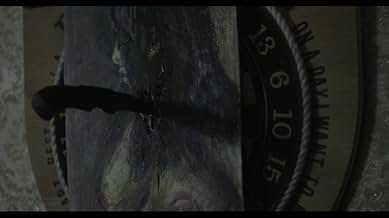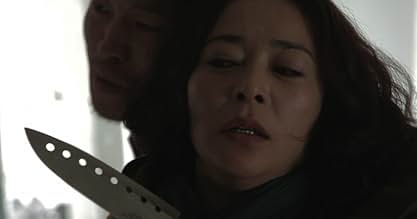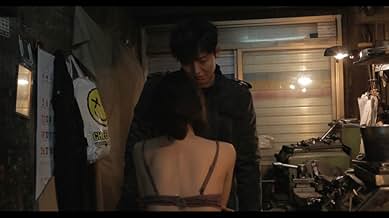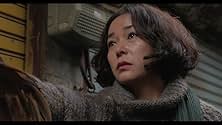NOTE IMDb
7,1/10
16 k
MA NOTE
Un usurier est obligé de reconsidérer sa violente manière de vivre lorsqu'une mystérieuse femme arrive et prétend être sa mère perdue depuis longtemps.Un usurier est obligé de reconsidérer sa violente manière de vivre lorsqu'une mystérieuse femme arrive et prétend être sa mère perdue depuis longtemps.Un usurier est obligé de reconsidérer sa violente manière de vivre lorsqu'une mystérieuse femme arrive et prétend être sa mère perdue depuis longtemps.
- Réalisation
- Scénario
- Casting principal
- Récompenses
- 25 victoires et 30 nominations au total
Lee Jung-Jin
- Gang-Do
- (as Jeong-jin Lee)
Woo Ki-hong
- Hoon-chul
- (as Ki-Hong Woo)
Cho Jae-ryong
- Tae-seung
- (as Jae-ryong Cho)
Heo Joon-seok
- Suicidal Man
- (as Jun-seok Heo)
Yu Ha-bok
- Container man
- (as Ha-bok Yu)
Avis à la une
Pieta is the story of revenge in a most brutal way possible by giving one's own life, a story of mother's love for his son. Story tells us the extreme measures taken by a mother to take the revenge from a non-human brutal loan shark.
Jung-Jin Lee is living a lonely life whose sole purpose is to recover the loan from other people by making them cripple and claiming their insurance money. In doing so he has become so cold inside that he feels nothing and know no pain. Brutality is the everyday life matter.
Enters a woman stirring everything by claiming that she is his mother. she make him feel love, make him angry and make him feel pain just to take the revenge of her son. And when Jung-Jin starts to feel human again, she inflicted the deep scar into his soul by giving her own life.
Movie is full of disturbing content and makes for a haunting viewing. I am a fan of south Korean cinema and this movie takes the love affair to another level.
8/10
Jung-Jin Lee is living a lonely life whose sole purpose is to recover the loan from other people by making them cripple and claiming their insurance money. In doing so he has become so cold inside that he feels nothing and know no pain. Brutality is the everyday life matter.
Enters a woman stirring everything by claiming that she is his mother. she make him feel love, make him angry and make him feel pain just to take the revenge of her son. And when Jung-Jin starts to feel human again, she inflicted the deep scar into his soul by giving her own life.
Movie is full of disturbing content and makes for a haunting viewing. I am a fan of south Korean cinema and this movie takes the love affair to another level.
8/10
Pieta (Meaning- A representation of the Virgin Mary mourning over the dead body of Jesus) a new film from Kim Ki-Duk, one of the genius directors working today.
Like his other movies, it is no different as it has all his key ingredients like; less dialogues, rural setting, on location shoot, assessment of relations and definitely metaphors.
The story of the film revolves around a depraved loan-shark who is reasonably heated, loaned money to the employees of industrial field. He beats and cripples the people who cannot pay the interests which is 10 times. The anger and sheer violence has become a part of his frenzy life.
Unexpectedly, enters a woman in his life claiming to be his mother who had abandoned him in his childhood. Presentation of relationship between these two people is fairly shocking and humane at the same time and it leads to an aftermath eventually.
Kim Ki-Duk has done some great character study here; it shows the moment of transcendence, ecstasy, agony and fulfillment. A revenge story will always have its murky side but keeping all the clichés aside, it makes you think that storytelling can change your life. You can feel the cruelty however; it is only suggestive and not happening on the screen, it can shake the ethics of humankind.
Highly recommended to the lovers of quality and Kim Ki-Duk movies.
Like his other movies, it is no different as it has all his key ingredients like; less dialogues, rural setting, on location shoot, assessment of relations and definitely metaphors.
The story of the film revolves around a depraved loan-shark who is reasonably heated, loaned money to the employees of industrial field. He beats and cripples the people who cannot pay the interests which is 10 times. The anger and sheer violence has become a part of his frenzy life.
Unexpectedly, enters a woman in his life claiming to be his mother who had abandoned him in his childhood. Presentation of relationship between these two people is fairly shocking and humane at the same time and it leads to an aftermath eventually.
Kim Ki-Duk has done some great character study here; it shows the moment of transcendence, ecstasy, agony and fulfillment. A revenge story will always have its murky side but keeping all the clichés aside, it makes you think that storytelling can change your life. You can feel the cruelty however; it is only suggestive and not happening on the screen, it can shake the ethics of humankind.
Highly recommended to the lovers of quality and Kim Ki-Duk movies.
The 18th feature film written & directed by Korean cinema's most notorious filmmaker, Pietà tells the story of a sadistic loan shark who ends up crippling people for not paying their debts, which after added interest is 10 times the amount they borrowed. Torturing with no feelings, his life takes a changing course when a middle-aged woman claiming to be his long lost mother comes into his life out of nowhere.
The film has all the disturbing elements one expects from Kim Ki-duk and although the first half has no easy-to-digest moments, the second half plays out very well to end on a satisfying, even rewarding, note. Cinematography reflects the appalling nature of the subject matter while editing presents a well-sought balance. The performances are pretty impressive from its two leads & the rest of filmmaking aspects are finely executed as well.
On an overall scale, Pietà is a highly tragic story of love, loss, revenge & redemption that has much more to offer than just disgust its viewers. Sure, Kim Ki-duk takes extreme pleasure in making his audience flinch but he also backs it up with enough justifications for the violence in his films. Shocking, unnerving, pitiful, haunting & infused with Christian symbolisms, Pietà is an unsettling psychological study of a mother-son relationship that also presents a fascinating take on what famously is Korean cinema's favourite genre.
The film has all the disturbing elements one expects from Kim Ki-duk and although the first half has no easy-to-digest moments, the second half plays out very well to end on a satisfying, even rewarding, note. Cinematography reflects the appalling nature of the subject matter while editing presents a well-sought balance. The performances are pretty impressive from its two leads & the rest of filmmaking aspects are finely executed as well.
On an overall scale, Pietà is a highly tragic story of love, loss, revenge & redemption that has much more to offer than just disgust its viewers. Sure, Kim Ki-duk takes extreme pleasure in making his audience flinch but he also backs it up with enough justifications for the violence in his films. Shocking, unnerving, pitiful, haunting & infused with Christian symbolisms, Pietà is an unsettling psychological study of a mother-son relationship that also presents a fascinating take on what famously is Korean cinema's favourite genre.
- Review originally posted at The Frame Loop. Visit www.theframeloop.com -
Even before the first image of an ominously hanging, rusty hook, Pieta comes to CPH PIX Film Festival with a great deal of infamy. The latest from South Korean, art-house provocateur Kim Ki Duk (3-Iron, The Isle) this unnerving revenge drama wowed last year's Venice Film Festival jury so much that it went on to beat Paul Thomas Anderson's The Master to the coveted Golden Lion award. Is it a better film than that aptly titled PTA project? Absolutely not. Is Pieta a gritty, harrowing and wholly engrossing exercise in cinematic tolerance? You're damn right it is.
Li Jung-Jin stars as Kang-Do, the merciless henchman to a crooked Seoul loan shark. Living in a threadbare apartment, with a diet consisting of half-cooked meat, he scuttles across the city, ruffling up people's feathers and making sure they pay up their debts, or else suffer the brutal consequences. His lonesome, pitiful existence is transformed by the arrival of Mi-Sun (Jo Min-Soo), an elderly woman claiming to be his estranged mother. Seeking repentance and the love of the inhumane monster she birthed and abandoned, the disbelieving Kang-Do puts her through a slew of horrific tests that will prove their bloodline, from eating dismembered body parts, to unsolicited incest. Boundaries are crossed, taboos busted open, and a repugnant relationship ensues.
Despite the industrial slum setting and the subtext of tooth/limbless capitalism, Pieta conforms to a typical Greek tragedy plot line. With each revelation more traumatic and sickening than the last, Kim tells the story with brute emotional force and savagery, without ever resorting to the ultra-violence made so common in South Korean cinema from the likes of Park Chan-Wook and The Vengeance Trilogy. While Jo Young-Jik's curious hand-held cinematography may look away from the most distressing of graphic acts, the pain lingers on the screen through Li and Jo's fantastic, expressionistic acting. The pair have a terse, inflammatory chemistry which is so enthralling that the mother-son relationship is all the more sickening.
Perhaps the film's success in Europe isn't all that surprising. Tackling the cruel storyline through emotional heft – without the archetypal glossy production values of the region - Pieta could be mistaken for a Lars von Trier or Gaspar Noé project. With a sublime first act, Kim gets lost in the knotty narrative he has laid out before him, and ties everything up in a stirring denouement that brings some genuine heart to the otherwise pitiful portrait of dog-eat-dog, Seoul city-living.
In that brilliant opening third, Mi-Sun turns to Kang-Do to denounce money as the 'beginning and the end of all things: love, honour, violence, fury, hatred, jealousy, revenge, death.' Unsavoury topics abound, Kim Ki-Duk combats them all with severe conviction in Pieta. If you can stomach such callousness, then this is diatribe is well worth a watch.
- Review originally posted at The Frame Loop. Visit www.theframeloop.com -
The very last scene of this movie would linger in your mind for quite a while. In Kim Ki-Duk's movies, you may find holes in storyline or awkwardness in acting. However, Kim never fails to give stunning visual images via which you could fly to another world in an instant.
In my opinion, elaborate scenarios or experienced actors/actresses are not prerequisite for Kim's movies. His movies are like abstract paintings or poems. They are not supposed to be realistic and are essentially vague in meaning. Do not expect his movies to be kind to give enough explanations. You should find their meaning with your own imagination.
At the expense of being confused and tortured with puzzling metaphors, you could reach the land of poetic beauty and religious purification. This moment of transcendence is what I expect from art, any kind including movie.
In my opinion, elaborate scenarios or experienced actors/actresses are not prerequisite for Kim's movies. His movies are like abstract paintings or poems. They are not supposed to be realistic and are essentially vague in meaning. Do not expect his movies to be kind to give enough explanations. You should find their meaning with your own imagination.
At the expense of being confused and tortured with puzzling metaphors, you could reach the land of poetic beauty and religious purification. This moment of transcendence is what I expect from art, any kind including movie.
Le saviez-vous
- AnecdotesShot digitally on two Canon EOS 5D Mark II DSLR cameras. The director operated one of the cameras himself.
- ConnexionsFeatured in At the Movies: Venice Film Festival 2012 (2012)
Meilleurs choix
Connectez-vous pour évaluer et suivre la liste de favoris afin de recevoir des recommandations personnalisées
- How long is Pieta?Alimenté par Alexa
Détails
Box-office
- Budget
- 103 000 € (estimé)
- Montant brut aux États-Unis et au Canada
- 22 080 $US
- Week-end de sortie aux États-Unis et au Canada
- 6 222 $US
- 19 mai 2013
- Montant brut mondial
- 6 616 296 $US
- Durée
- 1h 43min(103 min)
- Couleur
- Mixage
- Rapport de forme
- 1.85 : 1
Contribuer à cette page
Suggérer une modification ou ajouter du contenu manquant





























